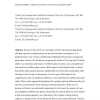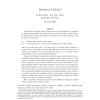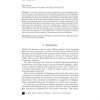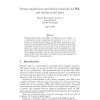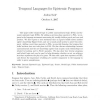JOLLI
2008
15 years 2 months ago
2008
Many social situations require a mental model of the knowledge, beliefs, goals, and intentions of others: a Theory of Mind (ToM). If a person can reason about other people's b...
JOLLI
2008
15 years 2 months ago
2008
111
click to vote
JOLLI
2008
15 years 2 months ago
2008
The aim of this article is to investigate whether choosing the appropriate referring expression requires taking into account the hearer's perspective, as is predicted under so...
101
click to vote
JOLLI
2008
15 years 2 months ago
2008
Saul Kripke's thesis that ordinary proper names are rigid designators is supported by widely shared intuitions about the occurrence of names in ordinary modal contexts. By th...
112
click to vote
JOLLI
2008
15 years 2 months ago
2008
Abstract. This paper presents a novel proof-theoretic account of dialogue coherfocuses on an abstract class of cooperative information-oriented dialogues and describes how their st...
112
click to vote
JOLLI
2008
15 years 2 months ago
2008
Abstract. This paper uses a partially ordered set of syntactic categories to accommodate optionality and licensing in natural language syntax. A complex but well-studied data set p...
119
Voted
JOLLI
2008
15 years 2 months ago
2008
In this paper, consistency is understood in the standard way, i.e. as the absence of a contradiction. The basic constructive logic BK c4 , which is adequate to this sense of consis...
JOLLI
2008
15 years 2 months ago
2008
While monadic second-order logic (MSO) has played a prominent role in model theoretic syntax, modal logics have been used in this context since its inception. When comparing propos...
138
Voted
JOLLI
2008
15 years 2 months ago
2008
This paper adds temporal logic to public announcement logic (PAL) and dynamic epistemic logic (DEL). By adding a previous-time operator to PAL, we express in the language statemen...


